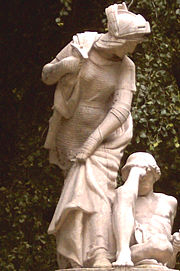Content deleted Content added
A. Kupicki (talk | contribs) wp:caption, more wp:rs material, wp:lede |
A. Kupicki (talk | contribs) closeup, etc. |
||
| Line 2: | Line 2: | ||
| name = Grażyna| title_orig = {{lang|pl|''Grażyna. Powieść litewska''}} |
| name = Grażyna| title_orig = {{lang|pl|''Grażyna. Powieść litewska''}} |
||
| translator = |
| translator = |
||
| image = [[Image: |
| image = [[Image:012Planty.JPG|180px]] |
||
| image_caption = |
| image_caption = Grażyna marble statue based on poem by Adam Mickiewicz, [[Planty Park]], [[Kraków]] |
||
| author = [[Adam Mickiewicz]] |
| author = [[Adam Mickiewicz]] |
||
| language = [[Polish language|Polish]] |
| language = [[Polish language|Polish]] |
||
| Line 14: | Line 14: | ||
'''''Grażyna''''' is a [[1823]] [[narrative poem]] by [[Adam Mickiewicz]], written in the summer of 1822 during a year-long sabbatical in Vilnius, while away from his teaching duties in [[Kowno]].<ref name="RRK">Roman Robert Koropeckyj, [http://books.google.ca/books?id=Pq1KOMGz2yUC&pg=PA35&dq=gra%C5%BCyna+by+mickiewicz&hl=en&ei=d6ObToawMobY0QHzroXEBA&sa=X&oi=book_result&ct=book-preview-link&resnum=6&sqi=2&ved=0CEYQuwUwBQ#v=onepage&q=gra%C5%BCyna%20by%20mickiewicz&f=false ''Adam Mickiewicz: the life of a romantic''.] ''[[Cornell University Press]]'', 2008. Page 35. ISBN 0801444713.</ref> Probably his first notable work. |
'''''Grażyna''''' is a [[1823]] [[narrative poem]] by [[Adam Mickiewicz]], written in the summer of 1822 during a year-long sabbatical in Vilnius, while away from his teaching duties in [[Kowno]].<ref name="RRK">Roman Robert Koropeckyj, [http://books.google.ca/books?id=Pq1KOMGz2yUC&pg=PA35&dq=gra%C5%BCyna+by+mickiewicz&hl=en&ei=d6ObToawMobY0QHzroXEBA&sa=X&oi=book_result&ct=book-preview-link&resnum=6&sqi=2&ved=0CEYQuwUwBQ#v=onepage&q=gra%C5%BCyna%20by%20mickiewicz&f=false ''Adam Mickiewicz: the life of a romantic''.] ''[[Cornell University Press]]'', 2008. Page 35. ISBN 0801444713.</ref> Probably his first notable work. |
||
The poem describes the exploits of a [[mythical]] [[Lithuanians|Lithuanian]] chieftainess Grażyna against the forces of the [[Teutonic Knights]]. The woman character is believed to have been based on Mickiewicz's own sweetheart from Kowno, Karolina Kowalska. The name was originally conceived by Mickiewicz himself, having used the [[Root (linguistics)|root]] of the [[Lithuanian adjective]] ''gražus'', meaning "beautiful".<ref name=calend>[http://kalendarz.pwn.pl/dzien.php?y=2007&m=4&d=1 April 1], a name |
The poem describes the exploits of a [[mythical]] [[Lithuanians|Lithuanian]] chieftainess Grażyna against the forces of the medieval Order of the [[Teutonic Knights]]. The woman character is believed to have been based on Mickiewicz's own sweetheart from Kowno, Karolina Kowalska. The name was originally conceived by Mickiewicz himself, having used the [[Root (linguistics)|root]] of the [[Lithuanian adjective]] ''gražus'', meaning "beautiful".<ref name=calend>[http://kalendarz.pwn.pl/dzien.php?y=2007&m=4&d=1 April 1], a name-day for Grażyna, #53 in Poland among the most popular names {{pl icon}}</ref> |
||
It was said by Polish writer [[Christien Ostrowski]] to have inspired [[Emilia Plater]], a military heroine of the [[November Uprising|November 1830 Uprising]]. |
It was said by Polish writer [[Christien Ostrowski]] to have inspired [[Emilia Plater]], a military heroine of the [[November Uprising|November 1830 Uprising]]. |
||
| Line 22: | Line 22: | ||
==External sources== |
==External sources== |
||
* Full text of ''Grażyna'' |
* Full text of ''Grażyna'' in [[Polish language|Polish]] including ''[[Konrad Wallenrod]]'', with both French and English translations, published in Paris in 1859, with foreword by Jan Tysiewicz. [http://books.google.ca/books?id=QwQOAAAAIAAJ&pg=PP1&dq=gra%C5%BCyna+by+mickiewicz&hl=en&ei=d6ObToawMobY0QHzroXEBA&sa=X&oi=book_result&ct=book-preview-link&resnum=3&sqi=2&ved=0CDgQuwUwAg#v=onepage&q&f=false Google books preview.] |
||
[[Category:Polish poems]] |
[[Category:Polish poems]] |
||
Revision as of 07:15, 17 October 2011
 Grażyna marble statue based on poem by Adam Mickiewicz, Planty Park, Kraków | |
| Author | Adam Mickiewicz |
|---|---|
| Original title | [Grażyna. Powieść litewska] Error: {{Lang}}: text has italic markup (help) |
| Language | Polish |
| Genre | Narrative epic poetry |
Grażyna is a 1823 narrative poem by Adam Mickiewicz, written in the summer of 1822 during a year-long sabbatical in Vilnius, while away from his teaching duties in Kowno.[1] Probably his first notable work.
The poem describes the exploits of a mythical Lithuanian chieftainess Grażyna against the forces of the medieval Order of the Teutonic Knights. The woman character is believed to have been based on Mickiewicz's own sweetheart from Kowno, Karolina Kowalska. The name was originally conceived by Mickiewicz himself, having used the root of the Lithuanian adjective gražus, meaning "beautiful".[2]
It was said by Polish writer Christien Ostrowski to have inspired Emilia Plater, a military heroine of the November 1830 Uprising.
References
- ^ Roman Robert Koropeckyj, Adam Mickiewicz: the life of a romantic. Cornell University Press, 2008. Page 35. ISBN 0801444713.
- ^ April 1, a name-day for Grażyna, #53 in Poland among the most popular names Template:Pl icon
External sources
- Full text of Grażyna in Polish including Konrad Wallenrod, with both French and English translations, published in Paris in 1859, with foreword by Jan Tysiewicz. Google books preview.